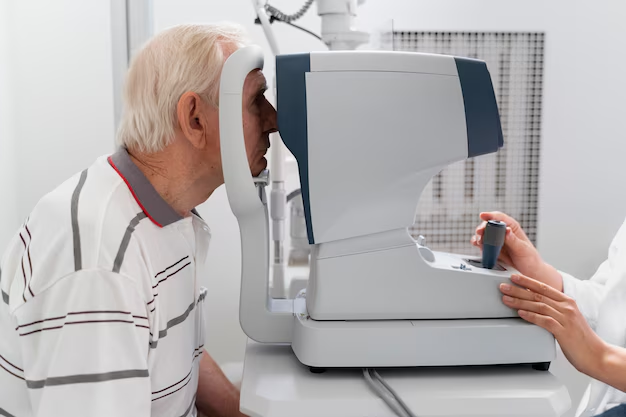Your Guide to Does Medicare Cover Lasik Surgery
What You Get:
Free Guide
Free, helpful information about Medicare FAQ and related Does Medicare Cover Lasik Surgery topics.
Helpful Information
Get clear and easy-to-understand details about Does Medicare Cover Lasik Surgery topics and resources.
Personalized Offers
Answer a few optional questions to receive offers or information related to Medicare FAQ. The survey is optional and not required to access your free guide.
Navigating Medicare: Is Lasik Surgery Covered?
Envision a life without glasses or contact lenses; for many, Lasik surgery offers this tantalizing prospect. This popular eye procedure, however, comes with the question: does Medicare cover Lasik surgery? Understanding the intricacies of Medicare's coverage for this type of elective surgery can help plan for your eye care needs.
What Is Lasik Surgery?
Lasik (Laser-Assisted In Situ Keratomileusis) is a laser surgery technique used to correct common vision problems caused by refractive errors—mainly nearsightedness, farsightedness, and astigmatism. By reshaping the cornea, Lasik improves vision so that dependency on glasses or contact lenses is reduced or potentially eliminated.
Medicare's Stance on Lasik Surgery
The main hurdle for Lasik enthusiasts? Medicare typically does not cover Lasik surgery. Why? Because it’s considered an elective procedure. Lasik generally falls under the umbrella of aesthetic or quality-of-life enhancements rather than medically necessary treatments. Medicare Part A and Part B, which covers hospital stays and outpatient care respectively, focus on medically necessary procedures and services. Therefore, unless Lasik is deemed necessary by a doctor to correct vision problems following an accident or surgery, it’s outside the scope of what Medicare covers.
Exploring Options Beyond Medicare
Fortunately, for those who do wish to pursue Lasik, there are alternative avenues for financial assistance or reducing the cost burden:
1. Private Health Insurance Plans
Some private insurance plans offer partial coverage or discounts on Lasik surgery through special agreements with certain providers. It's worth examining your policy or speaking directly with your insurer about possible benefits.
2. Lasik Financing and Care Credit
Many Lasik centers provide in-house financing options or work with companies like CareCredit, which allows you to pay off the cost of surgery over time with less immediate financial strain.
3. Flexible Spending Accounts (FSAs) and Health Savings Accounts (HSAs)
Utilizing an FSA or HSA can be an excellent way to offset some of the surgery costs. These accounts allow you to set aside pre-tax dollars specifically for medical expenses, including Lasik.
4. Vision Plans and Discount Programs
Additionally, some employers offer vision plans or discount programs that may provide reduced rates for Lasik surgery, making it more accessible.
Considerations for Other Support Programs
Beyond Lasik, if you’re navigating financial challenges or looking for additional resources, several government aid and educational programs exist to assist with various needs. They are worth exploring to provide greater financial flexibility:
- Government Aid Programs: Look into various financial aid programs or subsidies tailored to support general healthcare, housing, or education needs.
- Debt Relief Options: Consider debt consolidation or relief programs if financial stress impacts your ability to fund elective surgery.
- Credit Card Solutions: Some credit cards offer advantageous interest rates or reward points for medical expenses, contributing to a more affordable experience.
- Educational Grants: If you're juggling education and health expenses, educational grants may lessen financial pressure, freeing resources for other needs.
As the eye-refractive surgery landscape evolves, keeping informed about coverage and financing opportunities remains crucial. Whether it’s through leveraging health savings benefits or exploring assistance programs, financial preparation can bring the dream of clear, unaided vision closer to reality.
Financial Assistance Programs and Opportunities 📋💡
- 🏥 Private Insurance Adjustments: Discounts and partial coverage possibilities.
- 💳 CareCredit: Finance Lasik costs over time.
- 💸 FSAs/HSAs: Use pre-tax funds for surgery.
- 🤑 Employer Vision Plans: Explore prorated Lasik costs via work benefits.
- 📈 Government Aid Programs: Includes healthcare, housing, and educational support.
- 📉 Debt Relief Programs: Tools for managing broader financial obligations.
- 🎓 Educational Grants: Alleviate financial burdens, allowing more allocation for vision correction needs.
What You Get:
Free Medicare FAQ Guide
Free, helpful information about Does Medicare Cover Lasik Surgery and related resources.

Helpful Information
Get clear, easy-to-understand details about Does Medicare Cover Lasik Surgery topics.

Optional Personalized Offers
Answer a few optional questions to see offers or information related to Medicare FAQ. Participation is not required to get your free guide.


Discover More
- a Medical Provider That Accepts Medicare Assignment Must
- a Medical Provider That Accepts Medicare Assignment Must Quizlet
- a Medicare Patient Received Treatment That Isn't Covered By Medicare
- a Medicare Patient Receives Treatment That Isn't Covered By Medicare
- a Medicare Supplement Basic Benefit Is Quizlet
- a Medicare Supplement Companies
- a Medicare Supplement Policy Is Quizlet
- a Medicare Supplement Policy Must Not Contain Benefits Which
- a Patient Received Treatment In August Medicare
- Am I Eligible For Medicare
